#roger of hauteville
Explore tagged Tumblr posts
Text

#roger de hauteville#roger i#count#norman#normans#hauteville#sicily#italy#medieval#middle ages#crusades#crusader#crusaders#crusade#christianity#christian#art#christendom#normandy#roger of hauteville#history#europe#european#knight#knights
28 notes
·
View notes
Text
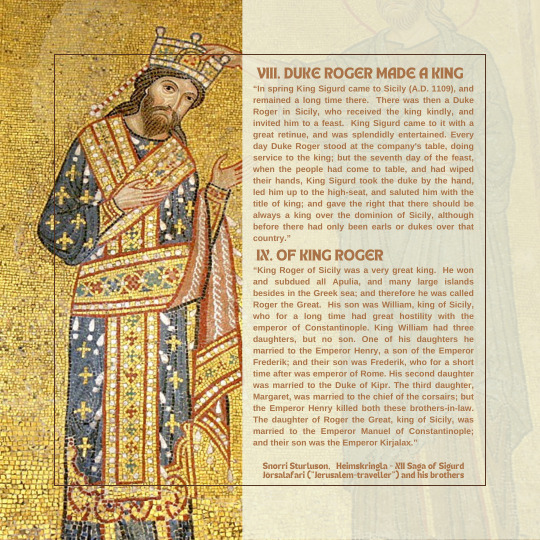
#snorri sturluson#heimskringla#roger ii of sicily#history#vikings#sigurd the crusader#house of hauteville#norman swabian sicily#people of sicily#myedit
8 notes
·
View notes
Text
Ryu Number: Pope Leo I, Pope Honorius II, and Pope Martin V
i've been busy uuhhhhhh have some popes (roman catholic)



Pope Leo I is the only pope to actually appear on-map in the game (as far as I remember), as well as the only pope to be explicitly identified. He appears at the end of Attila's campaign, where he meets with Attila and then Attila mysteriously decides to stop wrecking Italy. In real life, nobody actually really knows what the bunch sent by Roman Emperor Valentinian III (of which Leo I was a member) actually got across to Attila to get him to put his thing on pause, but a lot of stories like to credit the whole thing to Leo I 'cause post hoc ergo propter hoc, I guess.
Pope Honorius II is the pope in the The Hautevilles campaign that calls a crusade against Roger II of Sicily after the latter took over his dead first cousin once removed's stuff in Italy after said first cousin once removed died. The game makes it seem like Honorius II disliked it because Roger II had a policy of relative religious coexistence, but it was probably more political than that. Honorius II said that Mr. Cousin had left the lands to the Holy See and not to Rog, for one. Honorius II eventually recognized Roger II's claim in exchange for some concessions which Roger II more or less instantly ignored.
Finally, Pope Martin V is the pope in the The Grand Dukes of the West campaign who rules that Jacqueline, Countess of Hainaut never actually got divorced from John IV, Duke of Brabant, even if her divorce had been locally recognized and also she'd gotten married to Humphrey, Duke of Gloucester (brother of King Henry V of England) after. For Various Reasons, this put a crimp in Jackie's political career.
57 notes
·
View notes
Text
Le régime rend obligatoire le dépistage de la drépanocytose pour les nouveau-nés blancs.
Le régime a décidé de casser le thermomètre du remplacement racial.
Cette décision n’a aucun sens médical puisque les nouveaux-nés européens – les Blancs donc – ne sont pas affectés par cette maladie.
Vidal :
La drépanocytose touche essentiellement les personnes qui ont des origines africaines, antillaises, maghrébines, moyen-orientales ou indiennes. Les personnes issus de certains pays méditerranéens (Grèce, Sicile) sont également concernés par cette maladie, quoique moins fréquemment.
On l’ignore trop, mais la Sicile et la Grèce ont eu le déplaisir de tomber aux mains des violeurs afro-musulmans.
La Sicile a été occupée pendant 250 ans par les racailles avant d’être délivrée par quelques dizaines de Nazis originaires de Normandie dirigés par Roger de Hauteville, un redoutable skinhead d’origine viking.

Si vous connaissez Coutances, les fascistes ont installé une statue à sa gloire sur la cathédrale.

En Grèce, le pays a croulé sous les vendeurs de kebabs pendant 400 ans avant d’être libérée par une coalition de suprémacistes blancs composés de Russes, de Français et d’Anglais.
Hélas, les violeurs d’Anatolie étant ce qu’ils sont, si l’administration turque a déguerpi sans demander son reste, il en va différemment de la génétique qu’elle avait emmené dans ses caravanes.
Pour en revenir à ce dépistage, cela fait des années que le régime tremble devant la légitime utilisation des résultats par les médias qui s’opposent au remplacement de population.
Évidemment, d’après le système, c’était du « délire ».

Cette décision, dix ans plus tard, démontre que ce n’était pas si délirant. Le système préfère dépister inutilement les nouveaux-nés blancs plutôt que de laisser ces chiffres officiels circuler. Après tout, les statistiques ethniques ne sont pas interdites pour rien en France.
Nous n’aurons plus de belles cartes de cette politique effrayante poursuivie en secret par le système.
Nous vous proposons donc les derniers chiffres, ceux de 2022. Le total des nouveau-nés dépistés en France s’élève à 47,2%.

Il était de 45,8% en 2021 :

En 2015, sur la base des chiffres disponibles, l’institut Polémia avait proposé une anticipation. Il prévoyait 46% de naissances non-blanches en 2021 et 50% en 2024.
Nous étions un petit plus conservateurs et proposions plutôt 2027 comme année de bascule théorique, à raison d’une augmentation moyenne de 1% par an.

Certains sceptiques déclarent que dans diverses maternités les dépistages sont systématiques. Cela peut arriver, mais, comme on le constate, cela ne peut expliquer les disparités entre les régions sur une même année. En 2022, la Bretagne affiche par exemple un taux de 14,6% contre 36,2% dans le « Grand Est ».
Cela n’explique pas davantage l’augmentation marginale, mais régulière, de ce dépistage d’une année sur l’autre. Ainsi la Nouvelle Aquitaine passe de 19,5% de nouveaux-nés dépistés en 2021 à 21,4% en 2022.
Enfin, cela n’explique pas davantage l’explosion générale constatée sur les 20 dernières années. La Bretagne est ainsi passée d’un taux de dépistage de 3,47% en 2005 à 14,6% 19 ans plus tard.

Les cas de dépistages systématiques peuvent sporadiquement se retrouver dans les villes où le remplacement racial est si avancé que les maternités s’y embarrassent de moins en moins à distinguer la petite minorité de naissances blanches de l’énorme cohorte marron. Le personnel médical allogène doit d’ailleurs pester en interne contre ce qu’il doit percevoir comme un « privilège » accordé aux gwers maudits.
Peu importe ce point de détail, le tableau général demeure et il est laid, laid comme le faciès d’un groïde fraîchement déféqué par sa négresse de mère.

Sauf bouleversement imprévu, en atténuant les projections de Polémia, on peut estimer, avec une relative assurance, que d’ici à 2030 la moitié de la natalité en France sera non-blanche.
D’ici à 2045, ce sera les deux tiers.
Comme souvent évoqué dans notre média, la disparition progressive des boomers d’ici la décennie 2030-2040 va brutalement assombrir les rues. Les villes françaises de plus de 50,000 habitants seront quasiment toutes à majorité non-blanche.
Nous projetons une France à majorité non-blanche d’ici les années 2050-2060, c’est-à-dire d’ici 30 ans. Mais ce n’est là qu’une projection globale.
Géographiquement ou générationnellement, le basculement aura partiellement lieu avant.
Précisons aussi que si la ventilation des Afro-musulmans est la politique de l’État depuis Manuel Valls, la densité reste un facteur important. Tous les points rouges de cette carte seront des zones à minorité blanche bien avant 2060. Les zones bleues seront relativement moins touchées par le remplacement racial.

Ici, nous défendons le principe du séparatisme ethno-territorial, un véritable blasphème dans un pays façonné par deux siècles d’unitarisme jacobin.
Cette idée, quoique loufoque pour 99% des Français en 2024, deviendra une évidence d’ici 20 ans, au plus tard.
Une part croissante des Blancs ne voudra pas vivre à proximité des quelques 30 millions d’allogènes galvanisés par l’islam et dévorés par la soif de revanche raciale que leur avant-garde exprime déjà partout dans les médias.
Le racket fiscal au profit des masses parasitaires à peau sombre induit par le maintien d’un état unique poussera de plus en plus de Blancs à vouloir mettre un terme à l’expérience, directement ou indirectement.
Notre proposition d’un ou plusieurs états blancs est non seulement souhaitable, inéluctable, mais réalisable. Une comparaison avec l’état israélien en donne une idée.
Si un tel état factice peut exister au milieu d’un océan islamique, il n’y a pas de raison pour qu’un état blanc existe sur le territoire de la France actuelle.

Bien sûr, par principe, il faudrait expulser tous les allogènes, de gré ou de force. C’est d’autant plus souhaitable que c’est d’une grande facilité, mais à une condition : la volonté.
Concentrés dans toutes les villes de France, majoritaires dans un certain nombre de départements, voire de régions, une entreprise de reconquête territoriale généralisée nécessiterait en premier lieu une base étatique racialement homogène et racialement et politiquement consciente, instrument d’une force blanche déterminée à reconquérir et nettoyer l’ensemble du territoire français.
Le premier obstacle est la masse de traîtres blancs qui, pour diverses raisons, entend se ménager une cohabitation avec les allogènes. Ils sont l’ennemi prioritaire. Ce n’est pas cette république, fût-elle aux mains d’un parti de droite anti-immigration, qui pourrait le faire. Il est illusoire d’imaginer que l’État français, déjà très affaibli, puisse maintenir son unité politique et administrative sous l’effet du remplacement de population et de l’inévitable résistance autochtone qu’il nourrit par contrecoup avec en plus une bourgeoisie acquise à la capitulation.
La paralysie du système démocratique est déjà manifeste, avec la formation à l’assemblée « nationale » de blocs politiques implicitement raciaux qui n’ont aucune possibilité de compromis, mais mutuellement paralysés grâce au jeu de bascule de la bourgeoisie logée au centre.
Cela implique rien de moins qu’une révolution ethno-séparatiste sur des bases idéologiques nouvelles. Du noyau étatique ainsi formé, se réaffirmerait progressivement l’autorité blanche sur l’ancienne France. Cela prendrait du temps, mais avec une volonté et un programme, les moyens technologiques le permettraient à terme.
Tôt ou tard le point de bascule sera atteint et l’État se désagrégera. Il pourra perdurer fictivement sur une carte, mais dans la réalité il sera éclaté en régions ethniques dominées par une majorité ethno-religieuse.
Comme le Liban.

C’est la recomposition ethnique, territoriale, étatique qui fera suite à la défaillance de l’État français actuel qu’il faut d’ores et déjà anticiper. Dans un pays où l’État a créé la nation ex nihilo, les Français n’en prendront pas l’initiative. Il doit d’abord se décomposer dans les faits. Ce n’est que lorsque l’État ne pourra plus endiguer les assauts organisés des structures ethno-criminelles allogènes que ce scénario se matérialisera.
La disparition des boomers jouera un rôle important dans l’accélération de ce processus démographique et politique.
Nous faisons ici un énoncé. Dans la pratique, ce sera le résultat de chocs violents, d’affrontements ouverts et larvés, de soubresauts. Mais cela aura lieu et mieux vaut en avoir conscience dès à présent.
Démocratie Participative
3 notes
·
View notes
Photo





The monumental tombs of King Roger II, founder of the Kingdom of Sicily, and his daughter, Constance of Hauteville, with white marble canopies inlaid with glass mosaics - Palermo Cathedral
Photos by Charles Reeza
27 notes
·
View notes
Text
FOR WANT OF A NAIL
@baldwin-montclair @adowobsessed @sylverdeclermont @nicki-mac-me @thereadersmuse @kynthiamoon @wheresthesunshinesblog @adowbaldwin @beautifulsoulsublime @lady-lazarus-declermont @adarafaelbarba @dogblessyoutascha
Part Thirty-Four
Summary: Baldwin Montclair had a string of ex girlfriends, a single child, and a lifetime longer than most people could dream of to make all kinds of mistakes. His family knew one which kept coming out of the woodwork to irritate him every other century.
Also on AO3
‘I am willing to wed a vampire, but I draw the line at sleeping with one.’
Matthew swallowed a smile and forced himself not to look at Hugh as Adelasia del Vasto slid the marriage contract back across the desk.
Count Roger I of Sicily, from the House of Hauteville, had died of natural causes at the grand old age of seventy. His son Simon inherited the title, but when the boy died unexpectedly four years later, Simon's younger brother Roger took over.
Adelasia's husband had entrusted her with regency over their sons before he had passed. She came from the Aleramici, a legendary Frankish-Italian dynasty that ruled great swathes of Italy's northwestern territories. The founder of the line, Count Willehmus, had been Burgundian.
'No natural-born heirs' Matthew nodded, scratching a small amendment to the contract. It would have difficult to produce one even if it was biologically possible; Adelasia was thirty-seven, and Baldwin was masquerading as fifty-four.
Adelasia smiled at Martin's joke and clasped her hands together in her lap.
‘My son Roger will inherit everything when His Majesty...passes away.’
‘Of course’ Hugh nodded. Surprise flashed in Adelasia’s eyes but she seemed happy enough to keep her doubts to herself.
That was good. Baldwin was counting on it.
________________________________________________________________
Baldwin, king of Judea and Jerusalem, and defensor of the Holiest Sepulchre of our Lord, Jesus Christ, was broke. There had been almost non-stop fighting against Egyptian forces in the twelve years since he had taken the throne and the threat of bankruptcy was always lurking in the wings.
Adelasia had arrived in Acre with a fleet of eleven ships, five hundred Sicilian Saracen archers, jewels, cloth, and gold. The flagship had a masthead, stern and bow gilded with pure gold and decorated by master craftsman. The public had been enraptured by the opulent display and a buoyant, bubbling excitement ran through the city.
Baldwin was ecstatic.
‘This looks to be quite a wedding’ he tapped his wine glass lightly against Martin’s, grinning from ear to ear.
‘Money in the coffers, fresh soldiers for the ranks,’ Martin sipped his wine and beamed cheekily at Baldwin. ‘No sex though.’
‘Her loss’
‘Best of four?’
‘Shut up’ Baldwin chuckled.
________________________________________________________________
‘You need to have a look at this’ Martin dropped two pieces of parment onto Baldwin’s desk and dropped heavily into a chair.
The missives had arrived directly from church this morning; the first concerned the results of the Latin Patriarchate elections, and the other was a very serious message inscribed with the signature of the papal legate.
'Arnulf's been forcibly deposed.'
Baldwin swore and slammed the desk with his fist.
Arnulf of Chocques, Latin Patriach of Jerusalem, had been the one to suggest Baldwin's marriage to Adelasia in the first place, as a way to resolve his money troubles. If his majesty agreed to all terms, Arnulf had pointed out, he could steal himself a fortune legally.
'Three years after the fact and the Pope decides that he has an issue with it' Baldwin sighed and shook his head.
'He says that you married bigamously, since Arda is still alive and you entered into the wedding with the understanding that there would be no physical intimacy between you and therefore no heirs.'
'Her father hardly paid her dowry' Baldwin growled.
'But he paid.' Martin looked at him. 'You bled him dry for fifty percent before you cast her off, and you have milked this marriage for all it is worth. Perhaps you should return Adelasia to her son; I am sure she would love to be reunited with him.'
Baldwin relaxed his deathgrip on his chair and breathed out slowly.
'What now?'
Martin reached into the folds of his cloak and pulled out a large lump of parchment. The insignia pressed into the wax seal was Philippe's.
'Well-'
________________________________________________________________
Arda took a bite of baklava, read the note again, and nearly choked laughing.
'-parted on poor terms...oh, this is too much! Anoush!'
Her cousin stepped into the room, skirting around the servant on the floor giving Arda a foot massage.
'My beloved husband-'Arda spat the words through a smile, '-has written to ask me to return to his side in Jerusalem.'
'Surely you jest?!' Anoush grabbed the note from her cousin's hand.
'I do not.'
'The man is quite mad'
'Indeed' Arda pushed a second note towards her. 'Martin sends his regards as well.'
Anoush smiled fondly. She found it hard to hate her former partner, despite everything. Perhaps because when Martin found out where Baldwin had banished Arda he had told her immediately.
And he had been as gentle as he could to Vahagn at the end.
'How shall we answer them?' Anoush asked, eyes glinting mischievously.
Arda looked around the room.
'Bring me that oil lamp...and that bowl...'
________________________________________________________________
'Well, I think her answer is very clear' said Martin, poking through the pile of ashes that the messenger had nervously tipped out in front of Baldwin.
'The pope has restored Arnulf on the condition that he tear apart my marriage to Adelasia, Arda refuses to return, and pater is breathing down my neck to resolve this situation.'
Baldwin looked up at Martin.
'What the hell am I supposed to do?'
'...fake your death? ' Martin said, quietly.
Baldwin leant back in his chair and groaned in frustration.
________________________________________________________________
Roger clasped his mother's hand and looked mournfully at her.
'Can I not persuade you to stay?'
Adelasia smiled sadly and shook her head.
Her son had been nothing but wonderful since she had returned, showering her with gifts and making sure she was comfortable and happy. But something inside her had broken after the anullment of her marriage to Baldwin at Acre; something that all the familial love in the world wasn't going to fix.
‘The quiet of the convent will do me good.’
The Convent of San Bartolomeo was in Palermo, the capital of her son’s empire. It was a beautiful complex, dedicated to St Bartholomew the Apostle; the follower of Jesus was matyred by being skinned alive, and subsequently became the patron saint of tanners, plasteres, tailors, leatherworkers, bookbinders, farmers, housepainters, butchers and glove makers.
Fitting, really. Her husband had stripped her of her wealth, her health and apparently her happiness.
Roger swallowed the lump in his throat and blinked rapidly. ‘I will never forgive those bastards for how they have treated you. Never. I swear it.’
Adelasia squeezed his hand. ‘I know.’
________________________________________________________________
They waited until the cover of night to smuggle Baldwin out of the city. Jerusalem was in mourning for its king and the heir apparent was expected to arrive any day. It wouldn't do for "Baldwin II" to arrive early.
'You could stay,' Baldwin said, quietly. 'I will need advisors I can trust.'
But Martin was already shaking his head.
'I have been away from Burgundy for too long. Better to return and relieve Estienne from the burden than return after the man has grown weary of his position. I will miss you.'
Startling to realise how true that is.
Baldwin said nothing but pulled Martin into a hug. He squeezed him firmly, and clapped him on the back.
'I will return some day to check up on the place. Take care not to burn it all to the ground.'
Baldwin snorted. 'Brakāto'
'Natrik'
They climbed up onto their horses and turned, riding off in different directions and ignoring the urge rising in their chests to turn back around and watch the other go.
Author’s Notes
Adelasia del Vasto was wealthy, widowed and wise. She was commended in her lifetime for being a prudent woman; a good ruler and an excellent mother who had a good relationship with her remaining son Roger. Adelasia died on 16 April 1118 and was buried in Patti. Roger II was outraged at the treatment of his mother and never forgave the Kingdom of Jerusalem.
Baldwin, king of Judea and Jerusalem, and defensor of the Holiest Sepulchre of our Lord, Jesus Christ was how he was referred to in a charter from 1104.
Wimple - a type of headdress worn by women in the middle ages
brakāto - bragget
natrik - snake
#bibaldwin#baldwin montclair/male oc#baldwin montclair#baldwin de clermont#a discovery of witches#all souls trilogy#adow#all souls series#all souls tv series#adow spoilers#a discovery of witches season 1#a discovery of witches season 2#a discovery of witches season 3
14 notes
·
View notes
Text
Sicily: An Island at the Crossroads of History Ch. 4- The Normans
With the Normans, Sicily would come into her golden age. Unfortunately for Sicily, that golden age ended 800 years ago.
In 911, Rollo, a Viking, first rowed up the Seine river in France. By a hundred years later, his followers had most of the eastern half of Normandy (a section of northern France) under their control. The descendants of these men were quick-witted, adaptable, and seemingly blessed with an inexhaustible energy. The early Norman adventurers were also enormously, um.... prolific. They were ready adventurers for the Crusades, and generations made the treks to the Holy Land through the Mediterranean. One of the pilgrimage stops on the way to the Holy Land was at Monte Sant'Angelo on the Italian side of the Adriatic. There, in 1016, a Lombard told the visiting Normans of a considerable territory that was now under Greek Byzantine occupation. Perhaps, e suggested, a joint Norman/Lombard army venture could dislodge the Greeks, such help being the kind of thing the Lombards would not forget. The opportunity proved irresistible to the adventurous Normans. They returned to Normandy to restock and get some more guys, then they came back and made themselves a force in southern Italy. An obscure Norman baron there, Tancred de Hauteville, bore something like 3 daughters and 12 sons. One of those sons, Robert Guiscard, proved himself to be one of the great military adventurers of all time.
For the first generation of Normans, Sicily was of little interest. But in 1035, a civil war between the Arab clans that had been bubbling, finally came to a boil, and the Emir al-Akhal of Palermo found himself desperate for help. He appealed to Emperor Michael of Constantinople, and Michael, who had considered the Greek speaking population of Sicily a birthright of the Byzantine empire, saw an opportunity to insert himself back on to the island. The Greek force stopped in Salerno to pick up more soldiers, and while there, they attracted the attention of the Normans, who were just milling around looking for something worthwhile to do.
Around 1038, the Byzantine forces arrived on Sicily, including the Hautevilles. The Greeks succeeded in dislodging the Arabs, but divisions among the Greeks caused problems and, realizing they were in no shape to continue on, they beat a hasty retreat. There was a dispute among the Normans and the Greeks over the fairness of the spoils, the Normans considering they weren't quite getting what they were owed.
The Normans returned to the mainland disgruntled and even the Pope was concerned by the group of discontented soldiers in his proximity. Pope Leo IX decided the best defense was a good offense and led an army against the Normans, but the Pope was defeated. The Normans, however, treated them with respect and, for a reward, the Pope awarded Robert dukedoms in Apulia, Calabria, and Sicily.
Though Sicily had never been under Papal control, that didn't stop the Normans from looking to the island they had now seen and fought over. Roger Hauteville was only 26 at the time, but he was a fighter to match any, and in 1060 he had forced the surrender of the Greeks across from Messina. By 1072 the brothers had fought their way to Palermo. Robert claimed suzerainty over the island, but his brother Roger would be the one effectively in control.
Sicily had been in Muslim hands, but would now be transformed.
The first order of business was establish Norman rule, but with only a few hundred knights, he knew he couldn't just bully his way to sovereignty. He would need to persuade the Muslims to voluntarily accept the new rule. This would require tolerance and understanding. So, Arabic was declared an official language, on equal footing with Latin, Greek, and Norman French. Roger won over the confidence of the people, and many who had fled the island beforehand came back.
The new Christian subjects, on the other hand presented a more difficult problem. The Greeks welcomed the Normans at first, but found the new guys more uncivilized than the Muslims. That plus they brought in a bunch of Latin priests and monks who were schismatics through and through. Though the Greeks had been promised their language and traditions would be respected, Roger would have to do more to gain their trust. So he rebuilt Greek churches and personally endowed Greek speaking foundations.
From these earliest days, Roger laid the foundation of a multiracial and polyglot society in which Norman, Greek, and Arab would, under a firm central government, follow their own traditions in freedom and concord.
By the end of the 1000s, Roger had the most enlightened kingdom in all Europe. We know little about his personal and private life, other than he lived up to the famed Norman fertility, producing between 13-17 offspring. He died in 1102. Sicily had exploded economically and merchants from all over the Mediterranean came to the island.
His son Roger II took control in 1108. He wanted to increase the size of his rule and make his power and presence felt in mainland Europe, Africa, and Asia too.
On Christmas 1130, the Pope granted Roger II the royal crown of Sicily, Calabria, and Apulia.
Roger, at this time, ruled the third largest kingdom in Europe. He was born in the south of an Italian mother, educated by Greek and Arab tutors, and grown up in the cosmopolitan atmosphere of tolerance and mutual respect created by his father. He instinctively understood the complex system of checks and balances on which the internal stability of the country depended.
While the feudal barons on the mainland would cause problems, things were much easier in Sicily. Feudalism had not existed there. Things depended on mutual respect and religious and ethnic tolerance. The Arabs were entrusted with the state finances since their math was more advanced than anyone else's. The navy was run by the Greeks since they produced the best sailors. The art and architecture of the time is truly a wonder to behold: Latin, Byzantine, and Islamic traditions blended.
We can keep in mind that this time period was 100 years after the great schism which saw blood drawn between the Byzantine and Latin church. The Crusades were also in full swing, with both Christian and Muslim blood flowing in the Holy Land. Yet here in Sicily, the three civilizations came together and harmonized.
The court at Palermo was the most brilliant in Europe. By the 1140's, Roger had given a permanent home to the foremost scholars, scientists, doctors and philosophers, geographers and mathematicians in Europe and the Arab world. Roger himself was famous for his insatiable intellectual curiosity, and could converse in French, Latin, Greek, or Arabic.
Roger II died in 1154.
0 notes
Text
[Histoire] Les Normands, monarques éclairés (La dynastie Hauteville et le Royaume de Sicile)
En 1090, à l’issu de trente ans de conquêtes, la Sicile est occupée par les Normands. Singulière monarchie que Ia leur, construite avec la collaboration de fonctionnaires et d’officiers musulmans, bâtie sur Ie modèle fatimide, œcuménique comme l’étaient ses prédécesseurs, et qui permettra l’épanouissement d’une remarquable synthèse culturelle. Par Henri Bresc

L’histoire de la Sicile musulmane impose deux leçons: Elle met d’abord en lumière les relations complexes entre politique et religion. Ici, pas d’opposition bloc contre bloc: les musulmans font appel, contre leur émir même, au souverain byzantin et trouvent refuge dans les régions chrétiennes. La monarchie normande se construit avec la collaboration de fonctionnaires et d’officiers musulmans. Le tout en parfait contraste avec le rôle de base de djihad qu’exerce l'île et avec la mission de défenseur des Chrétiens qu'exalte le roi normand. C’est dire la pluralité des registres ou puiser la légitimité, la multiplicité des discours possibles et la réalité des passages et des transmissions d’une structure politique et administrative à sa rivale. La Sicile musulmane illustre ensuite la longue permanence de l’oecumenisme, non tant une tolérance des autres religions qu’un point de vue supérieur, hautain, qui les embrasse toutes dans la perspective d’un dépassement. Comme dans l’islam des origines, il semble que la chrétienté ait été considérée en Sicile comme une coutume seconde, intégrable dans un islam essentiellement étatique et guerrier. De la même manière, les Normands ont donné à l’islam un statut implicite de religion révélée, à son tour intégrable dans la vision d’un futur lointain qui ralliera tous les cultes au christianisme. Ce sont ces nouveautés qui doivent être examinées et méditées.
Source: Henri Bresc, Qantara 72 été 2009, Dossier: La Sicile islamique et normande.
LIRE L’ARTICLE

#hauteville#histoire#médieval#moyen-age#sicily#roger 2#Frederic#empire#géographie#mediterranean#dynastie#normand#saint empire
2 notes
·
View notes
Text
lion

#Norman Sicily#Cappella palatina#Palermo#Roger II#Hauteville#medieval#art#mosaics#12th century#norman-arabic#arabic#lion#animal
65 notes
·
View notes
Text

"This Robert was Norman by birth, of obscure origins, with an overbearing character and a thoroughly villainous mind; he was a brave fighter, very cunning in his assaults on the wealth and power of great men;in achieving his aims absolutely inexorable, diverting criticism by incontrovertible argument. He was a man of immense stature, surpassing even the biggest men; he had a ruddy complexion, fair hair, broad shoulders, eyes that all but shot out sparks of fire. In a well-built man one looks for breadth here and slimness there; in him all was admirably well-proportioned and elegant... Homer remarked of Achilles that when he shouted his hearers had the impression of a multitude in uproar, but Robert’s bellow, so they say, put tens of thousands to flight." ~ Anna Komnene
The Norman adventurer Robert Guiscard, Count and Duke of Apulia (1016-1085), was the most famous of the Norman brothers, members of the Hauteville family, who entered the wars of southern Italy and carved out important principalities for themselves.
Of the early life in Normandy of Robert Guiscard, very little is known. In the 1030s his older brothers William, Drogo, and Humphrey went to southern Italy to serve as mercenary captains in the numerous wars between Lombards and Byzantine Greeks. Within 2 decades they had begun to establish themselves in castles and to carry great weight in the affairs of their adopted homeland. In 1046 Robert came to Italy to join them. Robert received no immediate benefits, and he, like other Norman knights ambitious for land and wealth in southern Italy, had to occupy himself in the many military campaigns and small battles that filled its 11th-century history. In 1049 Robert's brother Drogo offered him a castle in Calabria, and for the next 4 years Robert lived a life of brigandage and robbery, earning for himself the nickname Guiscard, the "Crafty One, " which he was to retain throughout his life.
Robert came out of Calabria in 1053, when a papal army, backed by the forces of the German emperor, threatened the Norman possessions in the south. In the battle of Civitate in that year, the forces of Norman-controlled Apulia crushed the armies of Pope Leo IX and won papal recognition for their conquests in the south. Robert spent the next 2 years completing the conquest of the last Byzantine lands in Italy. In 1057 Robert's brother Humphrey, Count of Apulia, died, and Robert, by now the most renowned leader of the Normans, succeeded him. To his younger brother Roger, Robert gave the task of driving the Arabs out of Sicily and adding the island to his possessions.
In 1059 Pope Nicholas II formally confirmed Robert's titles:Duke of Apulia and Calabria and Duke of Sicily, although the island had not yet been conquered. Robert, in his turn, swore an oath of loyalty to the Pope and agreed to pay tribute. In the brief space of 6 years the Norman-papal relations had been reversed. Instead of thieves and usurpers, the Normans were now loyal and faithful papal vassals, servants and allies of the Church. By 1060 Robert and Roger had expelled the Greeks from all of southern Italy except Bari, and they now concentrated upon the conquest of Sicily. This task took 30 years, years that Robert spent in suppressing revolts in Apulia and Calabria and in pressing the remaining Byzantine stronghold at Bari. In 1071 Bari fell to Robert, and the last Byzantine enclave in the West was lost. In the same year Norman forces finally captured Palermo, the capital of Sicily, and in 1072 Robert entered his new domains in triumph.
After dealing with yet another rebellion and surviving a protracted illness, Robert renewed his attempts to crush pockets of resistance to his rule. In 1077 he conquered Salerno, and in 1080, after years of disputes, wrangling over rights, and personal insults, Robert renewed his oath of loyalty to the papacy in the person of Pope Gregory VII and was in return confirmed in the possession of his lands. From 1080 on, Robert began to form another plan, this time to attack the Byzantine Empire itself, across Greece and the northern Aegean Sea to the very capital city of Constantinople. Throughout 1081 Robert assembled a massive fleet and army at the ports of Brindisi and Bari. In May 1081 Robert's fleet crossed the Adriatic. In a furious battle at Durazzo, Robert defeated the army of the Byzantine emperor Alexius I Comnenus and forced him to retreat. Alexius, however, had instigated a revolt in Apulia, and this revolt, along with an appeal from Pope Gregory VII for aid against the army of the German emperor, Henry IV, recalled Robert to the Italian mainland, where he spent 1082 and 1083 in suppressing the revolt in Apulia and preparing an assault on Rome to rescue the embattled Pope Gregory.
In 1084 Robert attacked the city of Rome, the German defenders fled, and the Normans entered the city and sacked and burned it, taking Pope Gregory with them. Gregory was installed in a palace at Salerno, where he died in May 1085. Several months earlier Robert had returned to the campaign in Greece. He resumed the campaign, which had faltered during his absence, and captured the island of Corfu. After wintering on Corfu, the Norman army was suddenly struck by a ravaging epidemic, possibly typhoid fever, and on July 17, 1085, Robert himself succumbed to it. He was buried at Venosa in Apulia.
#perioddramaedit#history#edit#history edit#robert de guiscard#robert of guiscard#count of apuila#leon ix#humphrey#2nd crusade#11th century#drogo#lombards#normands#byzantine history#calabria#love his nicknames#anne komnene#nicholas ii#alexios i#tom cullen#constantinopole#henry iv#medieval
27 notes
·
View notes
Text
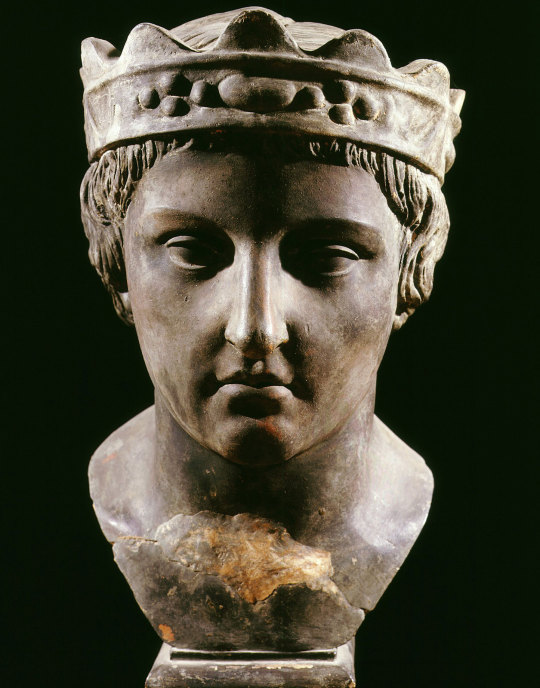
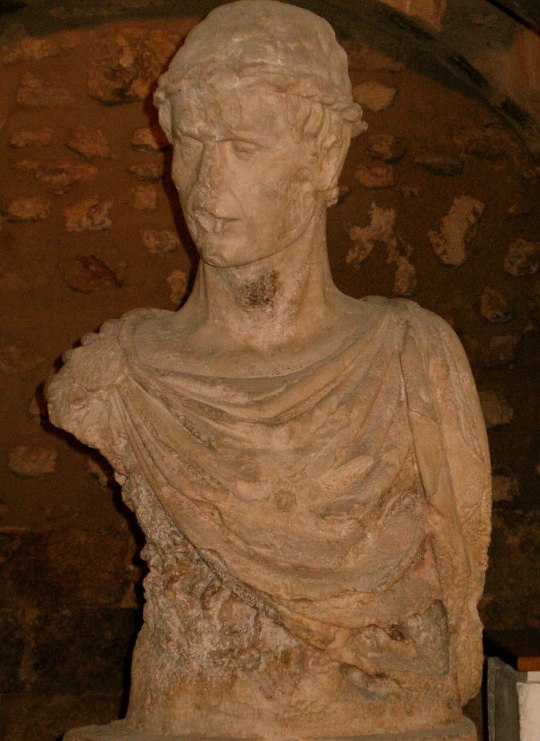
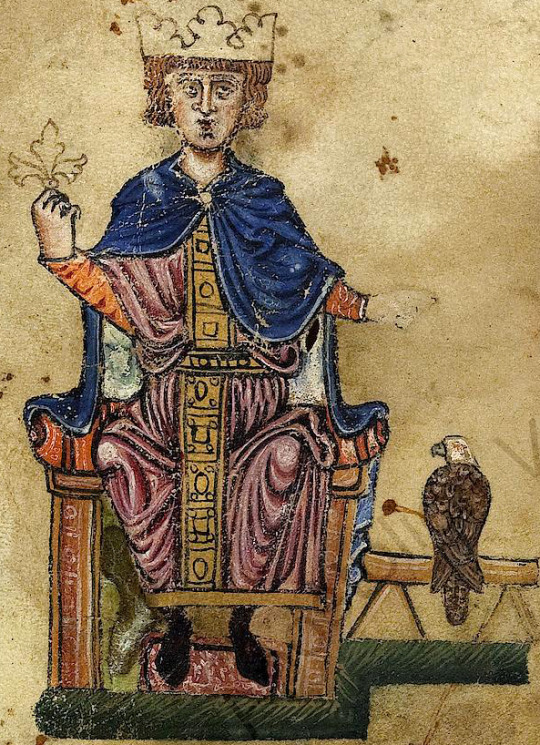


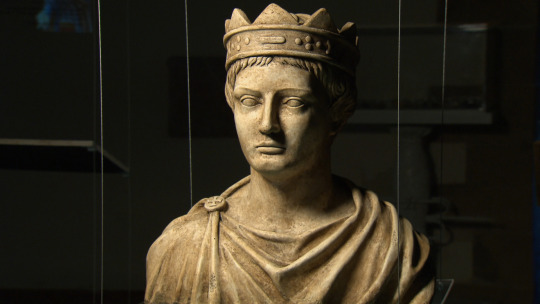
Frederick II, Holy Roman Emperor (1194-1250).
13th century Hohenstaufen Holy Roman Emperor.
.
He was King of Sicily from 1198, King of Germany from 1212, King of Italy and Holy Roman Emperor from 1220 and King of Jerusalem from 1225.
.
His political and cultural ambitions were enormous as he ruled a vast area, beginning with Sicily and stretching through Italy all the way north to Germany. As the Crusades progressed, he acquired control of Jerusalem and styled himself its king. However, the Papacy became his enemy, and it eventually prevailed. Viewing himself as a direct successor to the Roman emperors of antiquity, he was Emperor of the Romans from his papal coronation in 1220 until his death; he was also a claimant to the title of King of the Romans from 1212 and unopposed holder of that monarchy from 1215. As such, he was King of Germany, of Italy, and of Burgundy.
.
At the age of three, he was crowned King of Sicily as a co-ruler with his mother, Constance of Hauteville, the daughter of Roger II of Sicily. His other royal title was King of Jerusalem by virtue of marriage and his connection with the Sixth Crusade. Frequently at war with the papacy, which was hemmed in between Frederick's lands in northern Italy and his Kingdom of Sicily (the Regno) to the south, he was excommunicated three times and often vilified in pro-papal chronicles of the time and after. Pope Gregory IX went so far as to call him an Antichrist.
.
Speaking six languages (Latin, Sicilian, Middle High German, Langues d'oïl, Greek and Arabic), Frederick was an avid patron of science and the arts. He played a major role in promoting literature through the Sicilian School of poetry. His Sicilian royal court in Palermo, beginning around 1220, saw the first use of a literary form of an Italo-Romance language, Sicilian. The poetry that emanated from the school had a significant influence on literature and on what was to become the modern Italian language. He was also the first king to formally outlaw trial by ordeal, which had come to be viewed as superstitious.
.
After his death his line did not survive, and the House of Hohenstaufen came to an end. Furthermore, the Holy Roman Empire entered a long period of decline during the Great Interregnum from which it did not completely recover until the reign of Charles V, 250 years later.
[Submission]
#frederick ii#frederick ii holy roman Emperor#middle ages#medieval#medieval history#history crush#historical hottie#history#history hottie#historical crush#history lover#historical figure#history nerd#historical babes#historical
20 notes
·
View notes
Photo

Et quia solum Guilielmum Capuanorum Principem habebat superstitem, veritus ne eumdem conditione humanae fragilitatis amitteret, Sibiliam sororem Ducis Burgundiae duxit uxorem, quae non multo post Salerni mortua est, et apud Caveam est sepulta. Tertio Beatricem filiam Comitis de Reteste in uxoris accepit, de qua filiam habuit, quem Constantiam appellavit.
Chronicon Romualdi II, archiepiscopi Salernitani, p. 16
Beatrice was born around 1135 in the county of Rethel (northern France) from Gunther (also know as Ithier) de Vitry, earl of Rethel, and Beatrice of Namur.
On her mother’s side, Beatrice descended from Charlemagne (through his son, Louis the Pious), while on the paternal side she was a grandniece of Baldwin II King of Jerusalem (her paternal grandmother Matilda, titular Countess of Rethel, was the King’s younger sister). The Counts of Rethel were also vassals of the powerful House of Champagne, known for its successful marriage politics (Count Theobald IV of Blois-Champagne’s daughter, Isabelle, would marry in 1143 Duke Roger III of Apulia, eldest son of King Roger II of Sicily).
In 1151, Beatrice married this same Roger. The King of Sicily was at his third marriage at this point. His first wife had been Elvira, daughter of King Alfonso VI the Brave of León and Castile and of Galicia, who bore him six children (five sons and one daughter). However, when four of his sons (Roger, Tancred, Alphonse and the youngest, Henry) died before him, leaving only William as his heir, Roger II must have feared for his succession. In 1149, the King then married Sibylla, daughter of Duke Hugh II of Burgundy. She bore him a son, Henry (named after his late older brother), and two years later died of childbirth complications giving birth to a stillborn son. As this second Henry died young too, Roger thought about marrying for a third (and hopefully last) time.
It is possible that Roger’s choice of his third wife had been influenced by the future bride’s family ties with the Crusader royalties as Beatrice was related with both Queen Melisende of Jerusalem and the Queen’s niece Constance of Hauteville, ruling Princess of Antioch. Constance was also a first cousin once removed of Roger, who had (unsuccessfully) tried to snatch the Antiochian principality from her when her father Bohemond II was killed in battle 1130, leaving his two years old daughter as heir.
Beatrice bore Roger only a daughter, Constance, who was born in Palermo on November 2nd 1154. This baby girl (who would one day become Queen of Sicily) never knew her father as he died on February 26th.
Nothing certain is known about her widowed life, although we can suppose she took care of her only daughter. Beatrice died in Palermo on March 30th 1185, living enough to see Constance being betrothed to Emperor Frederick Barbarossa’s son, Henry.
The body of the Dowager Queen was laid to rest in the Chapel of St. Mary Magdalene, together with her predecessor, Elvira, and her step-children, Henry, Tancred, Alphonse and Roger. Through her daughter, Beatrice would become Emperor Frederick II’s grandmother.
Sources
Cronica di Romualdo Guarna, arcivescovo Salernitano Chronicon Romualdi II, archiepiscopi Salernitani Versione di G. del Re, con note e dilucidazione dello stesso
Garofalo Luigi, Tabularium regiae ac imperialis capellae collegiatae divi Petri in regio panormitano palatio Ferdinandi 2. regni Utriusque Siciliae regis
Hayes Dawn Marie, Roger II of Sicily. Family, Faith, and Empire in the Medieval Mediterranean World
Houben Hubert, Roger II Of Sicily: A Ruler Between East And West
SICILY/NAPLES: COUNTS & KINGS
Walter Ingeborg, BEATRICE di Rethel, regina di Sicilia, in Dizionario Biografico degli Italiani, vol. 7
#historicwomendaily#women#history#women in history#historical women#House of Hauteville#Roger II of Sicily#Beatrice of Rethel#norman swabian sicily#costanza i#people of sicily#women of sicily#myedit#historyedit
34 notes
·
View notes
Photo

King Roger II of Sicily (1095-1154) House of Hauteville Roger II was the King of Sicily from 1130 until his death in 1154. He is remembered for drastically expanding his realm and influence, while also consolidating his royal authority and becoming the first King of Sicily. Born as a son of Count Roger I of Sicily and Adelaide del Vasto, his father died in 1101 and was succeeded by his eldest son Simeon, who in turn died in 1105. This made Roger the Count of Sicily but, as he was only nine years old, a regency headed by his mother was established. Roger's personal rule commenced when he turned 16 in 1112. Throughout his reign; he claimed territories of, expanded his influence in and consolidated his position throughout the Norman lands of Southern Italy, something which brought him to conflict with the Papacy, as it was worried about increasing Norman influence. He was confirmed as Duke of Apulia in 1128-29 and when the Pope died in 1130, Roger supported Antipope Anacletus II, who rewarded him by declaring him King of Sicily. His ascension to royalty began a period of warfare as a coalition was launched against the new King, who was ultimately successful at repelling it despite suffering a number of defeats and many hardships. When Roger defeated the armies of the Papal States in 1139, his royal status was also confirmed by Pope Innocent II. Following this, he initiated a series of administrative reforms, centralized the kingdom, introduced a new currency, acquired much wealth and led the kingdom to prosperity. He turned his realm into a leading Mediterranean power and hired a number of Greeks and Arabs to serve him, exercising toleration for those of different creeds. In the second part of his reign, a series of grand expeditions were launched in North Africa and the Byzantine Empire, with Roger becoming King of Africa from the former and acquiring incredible wealth from the latter. The successful monarch passed away in 1154 at the age of 58 and was succeeded by William I, a perhaps underrated King who nonetheless lost a number of territories acquired by his father.
1 note
·
View note
Photo


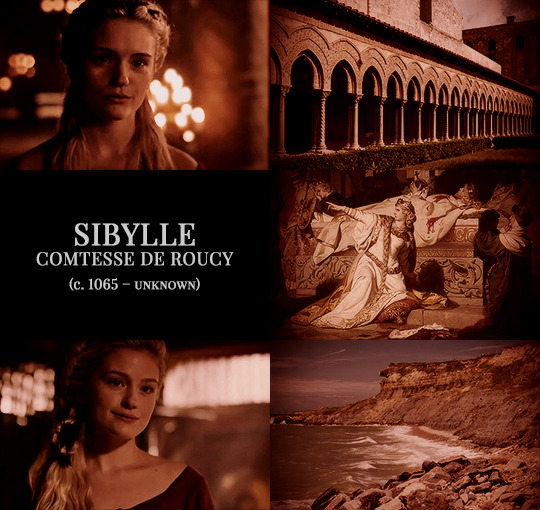
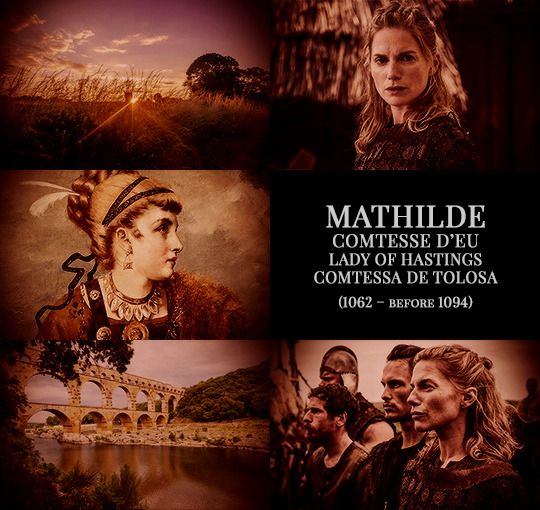

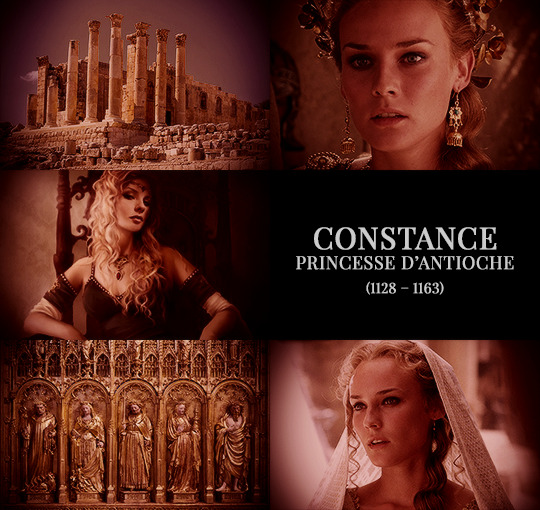
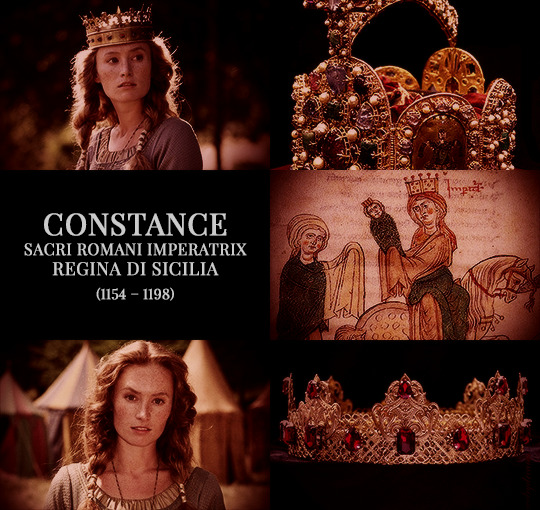


Women of the House of Hauteville
Emma de Hauteville. Daughter of Robert Guiscard and Aubrée de Bourgogne. Mother of Altrude de Hauteville, principessa di Salerno. Grandmother of Marie de Hauteville, comtesse d’Édesse.
Mathilde, comtessa de Barcelona. Daughter of Robert Guiscard and Sichelgaita di Salerno. Grandmother of Ximena d’Osona, comtessa de Fois; Berenguera de Barcelona, reina de Castilla; Estefania de Barcelona, comtessa de Bigorra; Almodis de Barcelona; and Ermengarda, vescomtessa de Narbona.
Sibylle, comtesse de Roucy. Daughter of Robert Guiscard and Sichelgaita di Salerno. Mother of Mabel de Roucy, comtesse de Jaffa.
Mathilde, comtesse d’Eu and comtessa de Tolosa. Daughter of Roger Bosso and Judith d’Évreux.
Félicie, magyar királyné. Daughter of Roger Bosso and Éremburge de Mortain. Mother of Árpád-házi Zsófia.
Constance, princesse d’Antioche. Daughter of Bohémond II, prince d’Antioche and Alix de Jérusalem. Mother of Marie d’Antioche, Byzantine Empress; Philippa d’Antioche, dame de Toron; and Agnès d’Antioche, magyar királyné.
Constance, regina di Sicilia. Daughter of Roger II of Sicily and Béatrice de Rethel. Mother of Holy Roman Emperor, Friedrich II.
Elvire, comtesse de Brienne. Daughter of Tancrède I of Sicily and Sibilla di Acerra. Mother of Marguerite de Brienne, comtesse de Sidon. Ancestress of Jacquette de Luxembourg, Duchess of Bedford.
Constance, dogaressa di Venezia. Daughter of Tancrède I of Sicily and Sibilla di Acerra.
#house of hauteville#medieval#historyedit#french history#italian history#european history#asian history#women's history#history#royalty aesthetic#nanshe's graphics
118 notes
·
View notes
Note
(2/?) followed it to a T. Even in Ptolemic Egypt and post-alexander hellenistic greece there was a horrible history of scam artists and untrustworthy western doctors, well into the Roman empire, and into fuedal europe, to such a terrible extent that Roger de Hauteville expelled his all doctors and physicians from sicily, and forced all new ones to attend his state run school. One could even argue that a private medical system is in ethical conflict with the original Hippocratic oath
Fair point. I still think the philosophy behind it is valid and should be respected? And yeah, the private medical system is in conflict with it no doubt.
Its just a shame.
1 note
·
View note
Text
Chapters 2-4
Chapter 2: Bored
Bohemond of Otranto was bored. Bored of Otranto itself, of Norman Italy and the success of his late father's schemes for piecing together a duchy out of the petty principalities and exarchates in the toe and heel of Italy, much like his Uncle Roger had also done in Sicily, but mostly he was bored with the day-to-day business of being the disinherited son of a great man. His younger half-brother had cheated him out of inheriting the Duchy of his famous father, Robert de Hauteville, whom everyone had called Guiscard -- "the wily one" in the French of his family's native Normandy. If he were to rise to greatness, it would be through conquest of his own kingdom, much as Normans had been doing in the Mediterranean for the last 50 years. But while Bohemond was stronger that Duke Robert Guiscard, he lacked the cunning that had taken Roger and Robert from younger sons of a nothing nobleman to the Count of Sicily and the Duke of Apulia and Calabria in the course of their lifetimes. The problem for Bohemond was how to top their success, and it was a problem he could not solve.
If only Bohemond had been born a generation earlier. His father and uncle had been destined for obscurity, the sixth and twelfth sons of a second marriage of a minor noble. But almost all of the Hauteville brothers had followed their centuries-old Viking roots, and taken to raiding, traveling to Italy to make their names and scrabble titles and lands to rule. Guiscard had been the most successful, but his even his much younger brother Roger had gotten the prosperous island of Sicily as a virtual kingdom. If Bohemond had been born of that generation, then he could have used his ambition and strength to find himself a principality of some sort. Instead, all of the petty princelings had been gobbled up by his elders and he was left to serve his younger brother, also called Roger, who’d usurped his rightful place in his father’s legacy.
The Roman Empire had still controlled bits and pieces of southern Italy when the Hauteville clan arrived before Bohemond had been born. With his father, he’d crossed the Adriatic and attempted to march on the Roman capital in Constantinople. It always puzzled Bohemond why the Romans spoke Greek and why they did not rule the dusty, priest-ridden city of Rome to the north of his father's duchy, ruled by the Pope. But that did not deter him from his efforts to conquer it. He was made to conquer. But to rule? He'd not yet had the chance and things did not look good. He'd led armies for his father in campaigns against the Empire, but they had all failed, and Bohemond, while noble in his efforts to make the best of a botched adventure, had come away with nothing. When his father decided he wanted a new wife, he’d taken advantage of the fact that Bohemond’s mother was his too-close cousin, and thus Bohemond became a sort-of bastard, losing his patrimony to the children of his father’s second wife.
So his chance at inheritance was gone. And also gone were the days of a quick assault of a decrepit Roman fortress in Calabria or Apulia -- if he wanted his own County or Duchy, he would need to gather troops and try again to carve something out of the body of the Empire in the Balkans or the Peloponnesus. And the Emperor of the Romans, Alexis Comnenus, knew the Hauteville family from their earlier attempts, and was wary. So it was nothing doing there, at least not for now.
So Bohemond was just bored.
He'd even been given a boring name. Not Bohemond, that was his middle name, one he'd chosen to emphasize to focus on a life of adventure. His real name was Mark. Who ever heard of King Mark? No one would respect Duke Mark. Mark, at best, was a petty knight with a tiny hamlet, Sir Mark of the Cattle-Crossing. Bohemond was a name destined for greatness, but was Bohemond going to find a way to fulfill his destiny?
And so he was stuck in Otranto, staring out at the Ionian Sea, frustrated and bored. And then a ship came in, bearing the sign of a red cross on a field of white. It was a new flag, unfamiliar to Bohemond, so he headed down to the docks, hopeful that this would add a little excitement to his otherwise dull, dull life. What he found changed the world.
Chapter 3: Fat but Unhappy
Raymond of Saint Gilles should have been happy. Here he was, with a young and docile new wife, ruling over his warm, fertile lands of Toulouse and Narbonne. Just two autumns ago, his Uncle William had died and the inheritance had added much of the rich lands Provence to his growing principality spanning much of the Languedoc north of the Pyrenees. For a normal prince of his stature, life was good.
But Raymond was not normal. Yes, he had the girth emblematic of his rank, and had fathered children on all three of his wives, but inwardly he longed to make a great religious undertaking, and do Something Really Big for God. His peers among Europe’s ruling nobility paid passing service to God in their words, and perhaps in their giving to the church. But Raymond knew most of them were insincere, or at best motivated by fear of eternal damnation. He, on the other hand, loved God, and as lord over so many souls himself, Raymond longed to do some great deed to prove his devotion to the only Lord he had ever known. He’d taken a pilgrimage before. He’d fought the infidel in Spain. But he’d never found the one great deed worthy of his devotion to Father, Son, and Holy Spirit
So he was unhappy, despite his wealth, power, and tremendous good fortune.
Elvira was already pregnant with another child, and indisposed this morning. Rather than wait for her to emerge from her chambers, Raymond decided to go hawking. With the barest of retinues, he ventured forth from Toulouse and headed north into the countryside. Coming up the main road from Cahors, he spied riders – one clearly with the Papal crest flying behind him – and when they reached him, he was excited to see he’d been summoned to Clermont, a church city far to the north, to meet with the Pope himself and with Adhemar, the powerful Bishop of Le Puy. Perhaps this was his moment, his chance to do something truly great for the Lord. Had the Church chosen him to bring Spain fully back into Christendom? He longed to find out what his Holiness had planned for him.
He sent a page back to tell Elvira to pack and meet him start packing, and to meet him in Clermont, several days ride to the north. She would be days in planning, what with her pregnancy and the general difficulty that came with a young Duchess eager to establish herself as worthy of her new titles. Rather than wait for her, he and the rest of his train went directly north, eager to learn what St. Peter’s successor had in store.
As they rode off, something strange occurred to Raymond. Suddenly he was happy.
Chapter 4: The Disinherited Duke It wasn't just. His uncle Godfrey had chosen him as to be his heir, probably because they shared a name. And as heir to the title of Duke of Lorraine, that was supposed to make him, well, the Duke of Lorraine, the rich lowlands that stretched from Cologne to the mouth of the Rhine. He wasn't an oldest son, that was his brother Eustace who had inherited their father's title of Duke of *Upper* Lorraine, but Uncle Godfrey, that old hunchback who couldn't father a child for all the gold in Christendom, had named Godfrey his heir. And when he died, the King of Germany hd pushed Godfrey aside. It wasn't just! As he did on most days, Godfrey stewed on this for several hours, ranting about how Henry IV, whom everyone knew would eventually be crowned Holy Roman Emperor , had basically just taken Godfrey's inheritance and given it to Henry's own son Conrad. Now Godfrey was hardly any better off than his twerp of a little brother, Baldwin. Henry had left Godfrey nothing but scraps -- the towns of Bouillon and Antwerp, little pinpricks on the map his family had controlled for eons, dating back almost to when Charlemagne had divided the empire and created Lorraine as the middle Kingdom between what was now France and Germany. Bldwin would snicker now and then, which Godfrey knew was just to get him started again, but sometimes he couldn't help it. It simply was not just.
In the first few years, Godfrey figured he'd keep pressing Henry for a fairer split of the lands and in the meantime he'd just carve out a bigger kingdom by fighting for it, but when he looked at the family map, he realized King Henry had chosen shrewdly. In every direction, his lands were surrounded, either by his own brother's patrimony, or by Conrad's, and if he fought against the son of his liege, there would be no chance of any further redress from that quarter. Godfrey was stuck.
But Godfrey was the direct heir of Charlemagne himself (well, through female line anyway), and he was not one to let a setback like this last too long. Sure, he had been moping about Bouillon for over a decade, but now it was time to act. Well, soon anyway. Baldwin pointed out he'd been saying that it was time to act for almost a decade since the first decade had passed, and that Godfrey was getting old and maybe even a little hunched himself, just like the Uncle who'd given him such a worthless paper title of Duke of Lower Lorraine. Godfrey and Baldwin had probably spent too much time together and things were getting a bit tense.
For some reason, as the morning drifted into afternoon, Bouillon was suddenly abuzz. This was particularly unusual because Bouillon was pretty much never abuzz. Godfrey dragged himself away from his full afternoon of self-pity and went to see what was going on. Baldwin tagged along of course; Baldwin was like his annoying shadow sometimes, almost an ever present reminder that despite his inheritance, Godfrey was also just a lesser son of a great house.
When they reach the courtyard, Godfrey got the news -- Pope Urban in Clermont, far to the south, had called for a great pilgrimage in force to liberate Jerusalem from the Saracens. On everyone's lips was a new word -- Crusade -- a taking of the cross as a sign of commitment to this great pilgrimage. And Pope Urban particularly wanted the nobility who could afford to leave their lands in the hands of the others, or better still who did not have lands to leave behind, to lead this Crusade. Godfrey had land, yes, but Bouillon and Antwerp had never been much to speak off and it wasn't going to hold him back now. Then he chuckled -- he'd give it to Baldwin and let him stew by himself while Godfrey set off for Jerusalem and a new chance for greatness, one that King Henry could not take from him this time.
3 notes
·
View notes